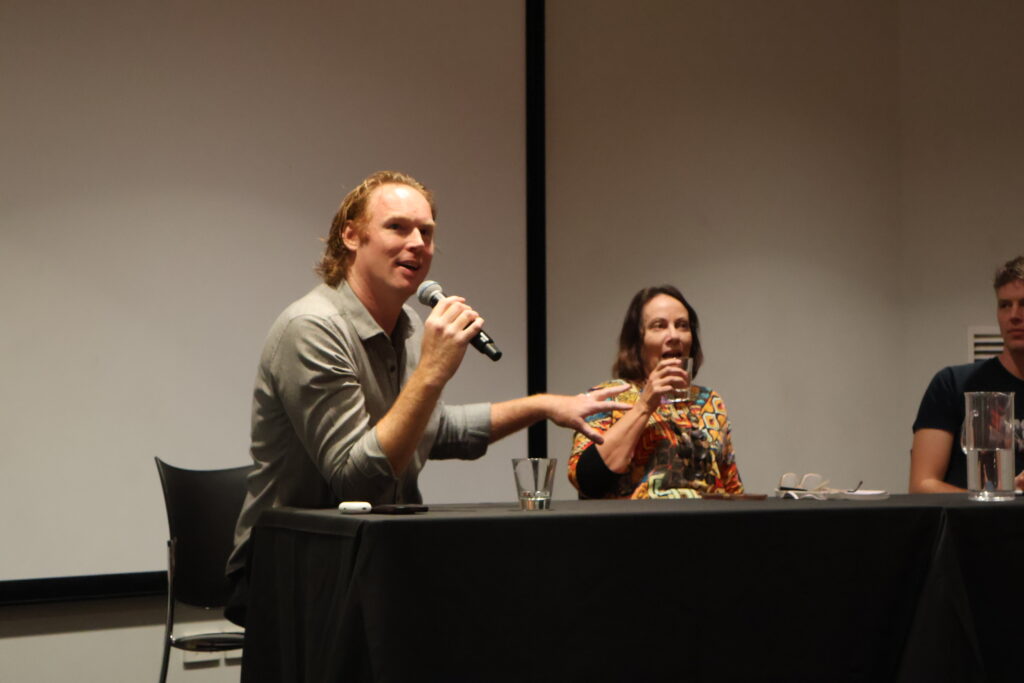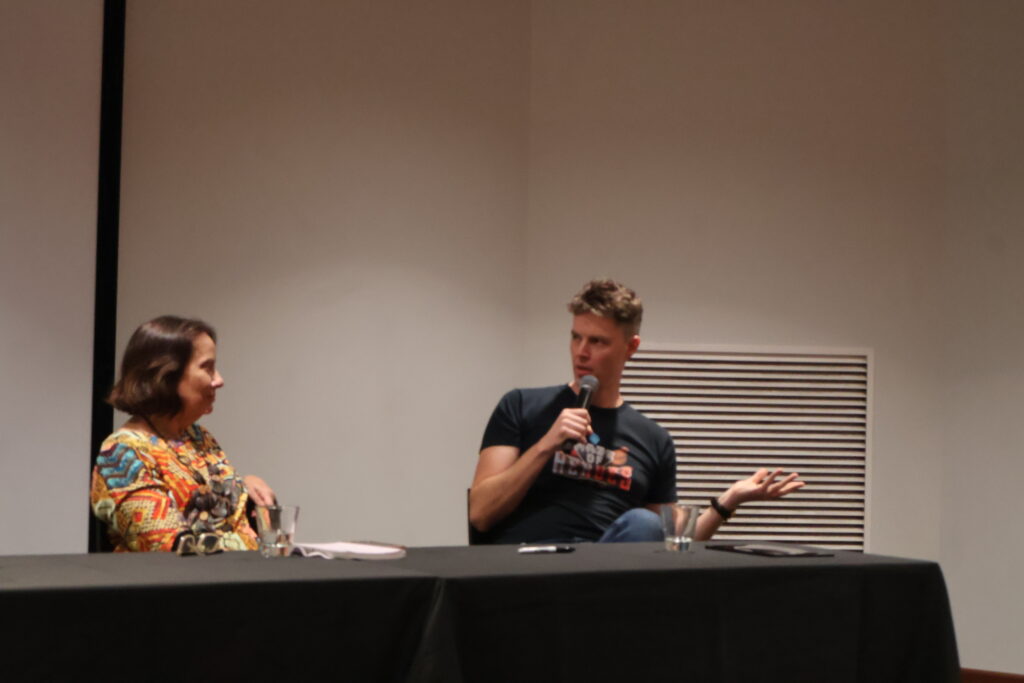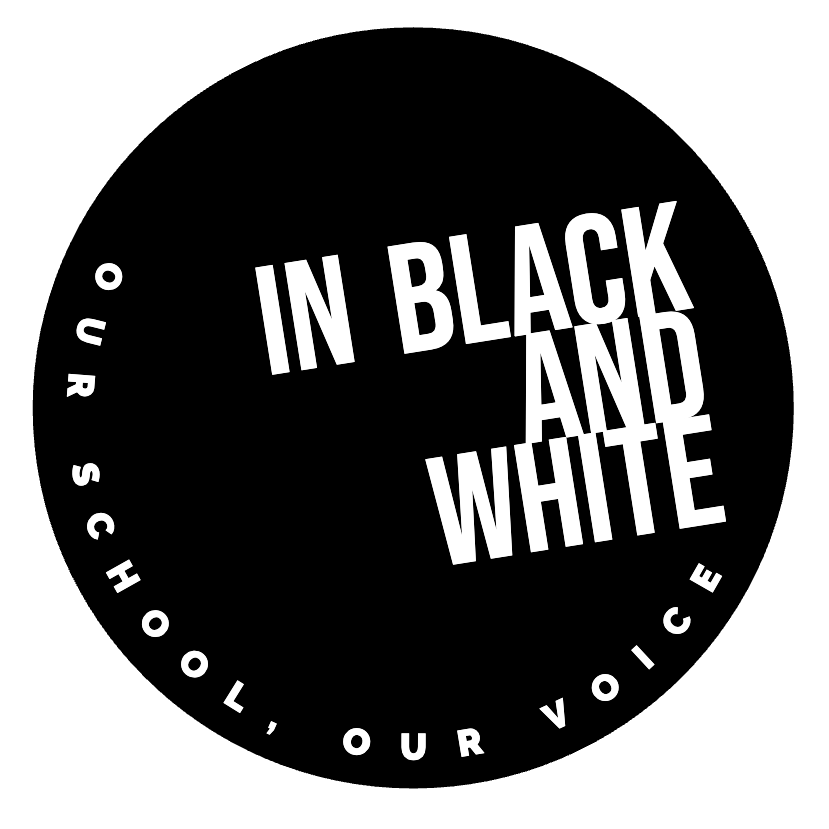Story by Sam Eyers
Photo by Ryan Low
Hosted by Ben Chamberlain and Evan Grilakis, May 7th, was filled with insightful discussion at the 2025 LitFest Panel. Three authors shared their thoughts and views on the ever-growing role of AI in the world of storytelling. Jack Heath is known for his fast-paced thrillers for young adults and children that often put them in moral dilemmas, exploring themes of right vs wrong and ethical decision-making. Joel McKerrow is a well-renowned poet and educator who focuses on identity, vulnerability and social justice. He uses poetry, the spoken word and creative expression to inspire reflection and change. Sue Whiting is a former teacher and currently a children’s book editor who is passionate about storytelling that resonates with children, focusing on themes like grief, courage and resilience.
The hosts laid out the topics – authenticity and voice, politics and policy of storytelling, and what the future of storytelling looks like – asking the authors for their existing opinions about AI.

Jack opened with a speech from ChatGPT and then discussed his experience with artificial intelligence and how it cannot capture “the messy beating heart of the human experience”. He commented on the flaw of the name, AI, and how it isn’t artificial because humans created and trained it, nor is it intelligent because it cannot fully understand what you are saying. He uses it sometimes when writing but its suggestions are always derivative and not useful.
Sue began with showing her notebook which she uses for deep thinking, writing down any sort of idea that comes to her and brainstorming different pieces of writing. Sue strongly disagreed with the use of AI in writing, discussing how it is essential for stories to be shaped by authentic human emotions. AI lacks that innate human creativity and have no heart, therefore offering us nothing. She said that storytelling is what sets us apart from the animal kingdom and it should also be what sets us apart from the mechanical world.
Joel said that as a poet, he is very excited for some aspects of AI and what it entails for the future. He has a friend with cerebral palsy who can’t speak coherently and AI has been able to understand her and dictate her speech when no-one else can which has boosted her creative freedom immensely. He illustrated the image of the blank page and the fear or hesitation we tend to feel when trying to write. He describes it as a creative muscle that we can’t just give away to AI.
Ben and Evan kicked off the night talking about an event earlier this year when Sam Altman shared a story written by their new narrative-focused chatbot, prompting widespread debate about authenticity and purpose. He asked them what their thoughts about this were.
Jack then commented on usefulness. You can’t put the genie back in the bottle, but if you’re writing what AI can’t, you’re useful and vice versa. With the development of these technologies, it is an opportunity for authors to focus on what AI cannot do – authenticity – and show how humans are different from AI. AI just writes using the statistically most likely word to come next, without any soul.
Joel highlighted the satisfaction of writing and how he writes for himself before anyone else. The creative process brings writers onto the page and we’re stripping ourselves of an important human process when we give in to ChatGPT.
They then delved into a discussion about the danger of young people using it so much, with Ben and Evan commenting on excessive use in class and how you can’t compress human heart into a computer. Sue talked about her experience in marking entries for a writing competition and how six entries were scanned for 100% AI. She thinks it’s terrible that students believe they can use AI for something like this.

Ben Chamberlain posed the question to the authors if they “would be comfortable with their works being used to train AI and in general using authors works to train AI?”
Joel started his response by clarifying that there was a difference between an author allowing their works to be used to train AI and companies stealing it.
He explained that Meta, formerly Facebook, had stolen works from numerous authors to train their AI bot. Authors have been furious about this unjust pirating of material but are sad to admit there is not much they can do in this situation.
However, Joel went on to say that if a company asked to use authors work then he thought it may be morally ok.
Sue struck a similar note in her statement that it is definitely not ok for companies to “steal” authors works, but she said that she would probably not allow her works to be used to train AI.
Jack had a different opinion as he supported the use of AI much more than the others and would definitely allow them to use his works; only if they asked for permission, of course. Jokingly, he mentioned that ii would “be better if he was compensated for it” but still agreed with the sharing of work.
He then went on to make a comparison between the indexing of books by Google, in which they asked authors if they could index their books so it could easily be searched by the search engine. Most authors came back positively and those who didn’t simply weren’t included in the program. There is a morally correct way to do this, Jack argued, but we have not seen this from some companies. He also proposed an alternate history where an AI chatbot is trained using Wikipedia articles that have been created for free by people and theorisies that most people who create Wikipedia articles would be ok with this.
After that response, Ben asked the authors how do we allow for a diversity of opinions in a world that may become written by one entity?
Joel lamented on this point that this was one of the things that he was most scared about AI, and how it could become an “echo chamber of our own opinions, and we must ensure that we keep our strong, individual viewpoints”.
Sue agreed that we could be slowly brainwashed by AI. The bland tone that it carries overriding our creativity and diversity in thought.
Jack pushed for a different viewpoint, “Noone has shown a desire to read AI stories” he stated, “So it concludes that it is unlikely that there will be an ‘AI brainwashing’”. Additionally, when Jack is writing a scene where one-character suspects another of lying; he must think about what the reader thinks is going on; then what the reader thinks the character thinks is going on; and what the reader thinks the character thinks the other character thinks is going on. “How much of that can AI do”, he argues, “it is just producing the most likely words, one after another.”
With the official questions done, the MC’s, Evan and Ben, moved to the audience. One person queried “What the role of writers is in shaping the way the world evolves and is understood, in a world of AI?”
Joel agreed that this was a key issue and that many social movements happen because of an artist. When the artist presents dissatisfaction in a current society and presents an exit from the world.
Sue elaborated on Joel’s point and commented on the importance of an individuals to keep their voice. Telling stories is the factor that sets us apart from other animals and is an essential part of the human experience; in naming emotions and expressing ourselves through story.Throughout the talk the authors demonstrated their own diverse views on the matter. Even simply doing a discussion like this in the world of AI would be impossible because, as the writers argued, the monotonous teachings of AI would not be able to build off of one another and hold different viewpoints.
